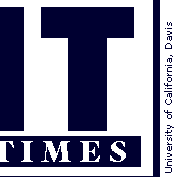- Windows 2000: W2K Replaces Y2K as Campus Issue
Windows 2000, set for release to the general public on February 17, has several components designed to replace Windows NT 4.0 Workstation, Server, and Enterprise Server. Contrary to what you may have heard, Windows 2000 is not intended to be a replacement for Windows 95 or 98 for the home or small office user.
--> More
- Where Are We Going? The (Near) Future of Information Technology
'Tis the season to make predictions, and the information technology experts are making plenty. We have compiled the following predictions from a variety of print and Web sources. Some of the categories emphasize new technologies; others, new paradigms for conducting business, managing our households, and entertaining ourselves. All promise to transform our lives and work.
--> More
- Where Have We Been? UC Davis Information Technology Statistics
Statistical charts illustrating trends in key Information Technology services during the period from 1995 to 1999 are presented.
--> More
- UC Davis Faculty on Technology
For this special issue, we asked a number of UC Davis faculty to comment on how and why they use information technology for instruction. We also asked them to identify some of the challenges and opportunities associated with incorporating information technology in teaching.
--> More
|
- Not with a Bang, but a Whimper: Y2K Came and Went
After more than two years preparing the campus for the dreaded Y2K bug, UC Davis' Y2K Emergency Preparedness team ushered in the New Year without incident. "Thanks to cooperation from everyone on campus, we sailed through the rollover without a hitch," says Faust Gorham, Manager, IT-Center for Advanced Information Technology and coordinator of Division of Information Technology's Y2K preparedness efforts.
--> More
- UC Davis Technology Highlights, 1972-1999
The following timeline demonstrates the accelerating pace of technological changes over the past three decades.
--> More
- How a Sandbox and a Computer May Supercharge Social Science
Keith Barton and Ray Shiraishi had a problem. Their research project, a study of child development based on a psychological therapy known as Sand Tray, was rapidly drowning in a sea of logistical struggles, data-entry nightmares, and subjective analyses. So Professor Barton and Graduate Research Assistant Shiraishi turned to computers to streamline the project. In the process, they may very well have changed the way social science research is organized in the future.
--> More
- More Modems Save the Day
The following timeline demonstrates the accelerating pace of technological changes over the past three decades.
--> More
|



